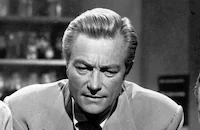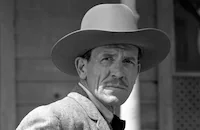The Gun That Won the West

Brief Synopsis
Cast & Crew
William Castle
Dennis Morgan
Paula Raymond
Richard Denning
Chris O'brien
Robert Bice
Film Details
Technical Specs

Synopsis
When Dakota Jack Gaines's Wild West Extravaganza comes to Washington, D.C., Jack's friend, Jim Bridger, with whom he served as a scout for Col. Henry Carrington in the 18th Cavalry, goes on in a wig dressed like Jack because Jack, as frequently happens, has gotten drunk, to the dismay of his wife Maxine. Gen. Carveth and Col. E. M. Still come backstage to speak with Jack, and Max encourages Jim to continue to pose as Jack. The Army officers relate that Carrington, under orders to erect a chain of forts along the Bozeman Trail in Wyoming, has asked the department to contract Jack and Jim to him because of their friendly dealings with Sioux chief Red Cloud. The railroad plans to go into Wyoming the next year and needs forts to protect the construction crews. Jim is skeptical about getting a new treaty with Red Cloud, but Max hopes this is just what Jack needs to put him on his feet again. Jim agrees to see Secretary of War Edwin McMasters Stanton, who tells him that the Springfield Rifle, which can be loaded and fired fifty times in three minutes, will soon be manufactured in quantity. Although he worries that Red Cloud may attack before the rifles are sent, Jim agrees to get the forts built. On the way to Fort Laramie, Jack sulks, angry that Max has sold the show out from under him and accuses Jim of trying to make his reputation by taking on the Sioux and Cheyenne, who together number 8,000. When a war party led by Red Cloud's right-hand man, Afraid of Horses, sees Jim, Jack, Max and Sgt. Timothy Carnahan approach, they attack. Jim shoots Afraid of Horses and the others leave, but he prevents Jack from killing him, so that Red Cloud will understand that they do not want war. At Fort Laramie, Jim and Jack learn from Carrington that Red Cloud, who previously has refused to talk, will arrive the next day. Upset that work on the forts will begin before the rifles arrive, Jack refuses to meet with Red Cloud and drunkenly tries to scare him with talk about the new rifles. Red Cloud now realizes he must attack before the guns arrive. The colonel angrily places Jack under arrest and orders him to stay at the fort. Max decides to leave her husband and help with the expedition, as she believes he no longer loves her. Meanwhile, Red Cloud meets with other Sioux chiefs and relates that under the proposed peace treaty, lands previously belonging to the Sioux will be taken away; in exchange, he says, the whites claim that the "Iron Horse" will bring "new learning and days of plenty." He challenges his people to remain a nation on their own land, and they agree to join the Cheyenne to drive the white man off their land. As the expedition nears Sioux land, Jim and his scouting party see hundreds of Indians approach, so they take to the rocks, where they battle until Carrington leads his troops to drive the Indians away. The whites realize that the encounter has been a warning. Jim suggests they hide in the Big Horn mountain area until the rifles arrive. With that plan in mind, they feign a retreat, but head instead for the mountains. When Max tells Jim, who has become enamored of her, that she plans to leave Jack, he warns against their getting involved and advises her to return to the fort, but she decides to stay. Meanwhile, Carnahan, who has returned to the fort to confer with Gen. John Pope, learns that the guns will arrive within five weeks. Jack, now sober, asks Carnahan to tell Max of his change only if he thinks she wants to hear about it. Sometime later, Sioux scouts locate the party in the mountains, and an arrow nearly hits Max. Carnahan, seeing her with Jim, delivers Jack's message to Max, cautioning her not to get "careless" because of the nearness of death. Afraid of Horses, realizing that the whites did not return to Fort Laramie, advises Red Cloud to attack the fort, but the chief refuses to send his men against cannon. When the rifles arrive at the fort, Jack convinces Pope to let him take one to Red Cloud to demonstrate it and discourage him from fighting. Jack is captured and taken to Red Cloud, who calls together the chiefs of the Sioux Nation to decide what to do. Although they decide against war, Red Cloud plans to kill Carrington and his men before the guns reach them. Jack knocks out Afraid of Horses and tries to escape, but is shot as he rides off. On the way to Carrington, Jack kills three Indians, but a survivor returns to Red Cloud, who now orders his tribe to war. After Jack informs Carrington about the Sioux approach, Jim rides to Pope to get his men with the rifles to intercept the Indians. Max realizes Jack's heroism. The Sioux are vanquished in the battle, and Jim drowns Afraid of Horses in the river. Later, Max and Jack ride off to start a ranch, leaving Jim behind.

Director

William Castle
Cast

Dennis Morgan

Paula Raymond

Richard Denning
Chris O'brien
Robert Bice
Michael Morgan

Roy Gordon
Howard Wright
Dick Cutting
Howard Negley

Kenneth Macdonald
Crew
Leon Chooluck
Al Clark
Sidney Clifford
Ross Dimaggio
Henry Freulich
James B. Gordon
Henri Jaffa
Leonard Katzman
Sam Katzman
Paul Palmentola
Virgil Smith

Film Details
Technical Specs

Articles
The Gun that Won the West
This film, a programmer that caused no great shakes, received a humdrum reaction from critics, with Variety deeming the "Indian scenes...more interesting than the characters," and several critics noting the lack of seamlessness in the integration of stock footage in Indian attack scenes. ("The tints and grain don't match," said Variety.) Clearly the picture was made on a tight budget.
The Gun That Won the West was a late-career credit for actor Dennis Morgan, who at the end of the 1950s essentially retired from the screen, save for a handful of cameos over the next twenty years, mostly in television. As Jeanine Basinger has written (in her book The Star Machine), Morgan is hardly remembered today but was a reliable, successful and quite popular star at Warner Brothers from the late 1930s into the 1950s. He never reached the top tiers of stardom like Humphrey Bogart or James Cagney, but Warners molded him into a typical, all-purpose studio product, capable of playing in almost any genre from musicals to westerns. Morgan appeared ably in films like Kitty Foyle (1940), Captains of the Clouds (1942), Christmas in Connecticut (1945) and One Sunday Afternoon (1948).
Leading lady Paula Raymond, who had previously appeared in such fine work as Devil's Doorway (1950), The Tall Target (1951) and City That Never Sleeps (1953), later said this was her favorite role at Columbia, and her favorite western among her work. Director William Castle had been directing since 1943 and would soon make his mark on the horror genre, starting with Macabre, House on Haunted Hill, and The Tingler, all released in 1959. Before those pictures, Castle would direct Dennis Morgan once again in Uranium Boom (1956).
The Springfield rifle had gotten its own full movie title just three years earlier, with the Gary Cooper western Springfield Rifle (1952).
By Jeremy Arnold

The Gun that Won the West
Quotes
Trivia
Notes
According to the Hollywood Reporter review, location shooting was done in Los Angeles' San Fernando Valley and in the canyons of Utah. Reviews criticized the extensive use of stock footage of Wild West shows, buffalo hunts and Indian fights. While onscreen credits list Ross DiMaggio for "Music conducted by," a Columbia production sheet credits Mischa Bakaleinikoff. Modern sources add Dennis Moore and Don Harvey to the cast.














